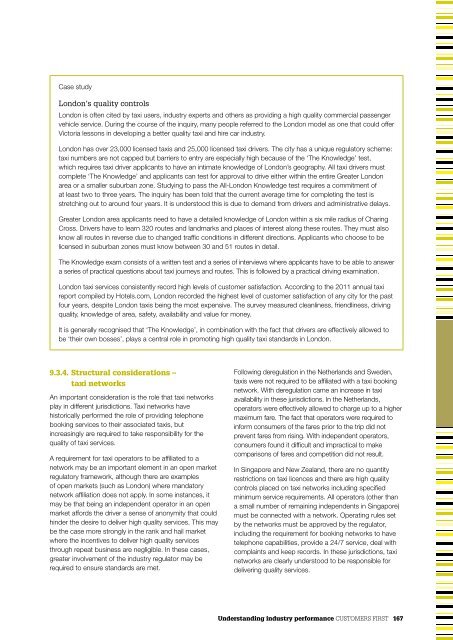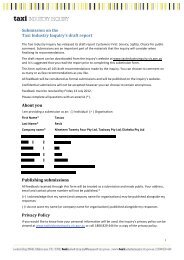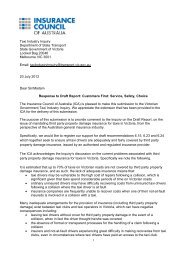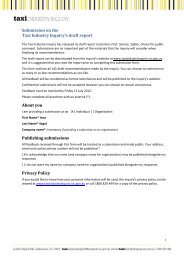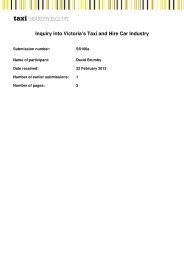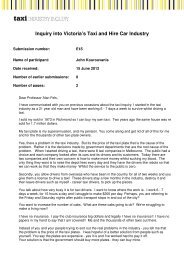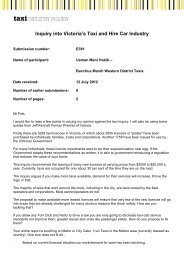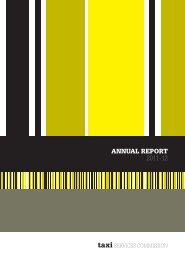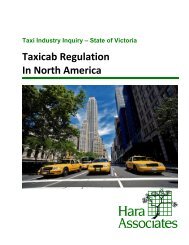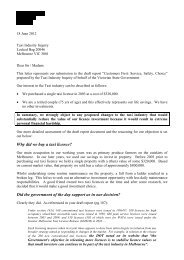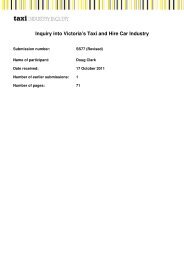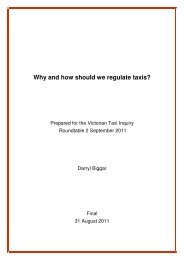Part D â Understanding and improving industry performance (PDF ...
Part D â Understanding and improving industry performance (PDF ...
Part D â Understanding and improving industry performance (PDF ...
Create successful ePaper yourself
Turn your PDF publications into a flip-book with our unique Google optimized e-Paper software.
Case study<br />
London’s quality controls<br />
London is often cited by taxi users, <strong>industry</strong> experts <strong>and</strong> others as providing a high quality commercial passenger<br />
vehicle service. During the course of the inquiry, many people referred to the London model as one that could offer<br />
Victoria lessons in developing a better quality taxi <strong>and</strong> hire car <strong>industry</strong>.<br />
London has over 23,000 licensed taxis <strong>and</strong> 25,000 licensed taxi drivers. The city has a unique regulatory scheme:<br />
taxi numbers are not capped but barriers to entry are especially high because of the ‘The Knowledge’ test,<br />
which requires taxi driver applicants to have an intimate knowledge of London’s geography. All taxi drivers must<br />
complete ‘The Knowledge’ <strong>and</strong> applicants can test for approval to drive either within the entire Greater London<br />
area or a smaller suburban zone. Studying to pass the All-London Knowledge test requires a commitment of<br />
at least two to three years. The inquiry has been told that the current average time for completing the test is<br />
stretching out to around four years. It is understood this is due to dem<strong>and</strong> from drivers <strong>and</strong> administrative delays.<br />
Greater London area applicants need to have a detailed knowledge of London within a six mile radius of Charing<br />
Cross. Drivers have to learn 320 routes <strong>and</strong> l<strong>and</strong>marks <strong>and</strong> places of interest along these routes. They must also<br />
know all routes in reverse due to changed traffic conditions in different directions. Applicants who choose to be<br />
licensed in suburban zones must know between 30 <strong>and</strong> 51 routes in detail.<br />
The Knowledge exam consists of a written test <strong>and</strong> a series of interviews where applicants have to be able to answer<br />
a series of practical questions about taxi journeys <strong>and</strong> routes. This is followed by a practical driving examination.<br />
London taxi services consistently record high levels of customer satisfaction. According to the 2011 annual taxi<br />
report compiled by Hotels.com, London recorded the highest level of customer satisfaction of any city for the past<br />
four years, despite London taxis being the most expensive. The survey measured cleanliness, friendliness, driving<br />
quality, knowledge of area, safety, availability <strong>and</strong> value for money.<br />
It is generally recognised that ‘The Knowledge’, in combination with the fact that drivers are effectively allowed to<br />
be ‘their own bosses’, plays a central role in promoting high quality taxi st<strong>and</strong>ards in London.<br />
9.3.4. Structural considerations –<br />
taxi networks<br />
An important consideration is the role that taxi networks<br />
play in different jurisdictions. Taxi networks have<br />
historically performed the role of providing telephone<br />
booking services to their associated taxis, but<br />
increasingly are required to take responsibility for the<br />
quality of taxi services.<br />
A requirement for taxi operators to be affiliated to a<br />
network may be an important element in an open market<br />
regulatory framework, although there are examples<br />
of open markets (such as London) where m<strong>and</strong>atory<br />
network affiliation does not apply. In some instances, it<br />
may be that being an independent operator in an open<br />
market affords the driver a sense of anonymity that could<br />
hinder the desire to deliver high quality services. This may<br />
be the case more strongly in the rank <strong>and</strong> hail market<br />
where the incentives to deliver high quality services<br />
through repeat business are negligible. In these cases,<br />
greater involvement of the <strong>industry</strong> regulator may be<br />
required to ensure st<strong>and</strong>ards are met.<br />
Following deregulation in the Netherl<strong>and</strong>s <strong>and</strong> Sweden,<br />
taxis were not required to be affiliated with a taxi booking<br />
network. With deregulation came an increase in taxi<br />
availability in these jurisdictions. In the Netherl<strong>and</strong>s,<br />
operators were effectively allowed to charge up to a higher<br />
maximum fare. The fact that operators were required to<br />
inform consumers of the fares prior to the trip did not<br />
prevent fares from rising. With independent operators,<br />
consumers found it difficult <strong>and</strong> impractical to make<br />
comparisons of fares <strong>and</strong> competition did not result.<br />
In Singapore <strong>and</strong> New Zeal<strong>and</strong>, there are no quantity<br />
restrictions on taxi licences <strong>and</strong> there are high quality<br />
controls placed on taxi networks including specified<br />
minimum service requirements. All operators (other than<br />
a small number of remaining independents in Singapore)<br />
must be connected with a network. Operating rules set<br />
by the networks must be approved by the regulator,<br />
including the requirement for booking networks to have<br />
telephone capabilities, provide a 24/7 service, deal with<br />
complaints <strong>and</strong> keep records. In these jurisdictions, taxi<br />
networks are clearly understood to be responsible for<br />
delivering quality services.<br />
<strong>Underst<strong>and</strong>ing</strong> <strong>industry</strong> <strong>performance</strong> CUSTOMERS FIRST 167


